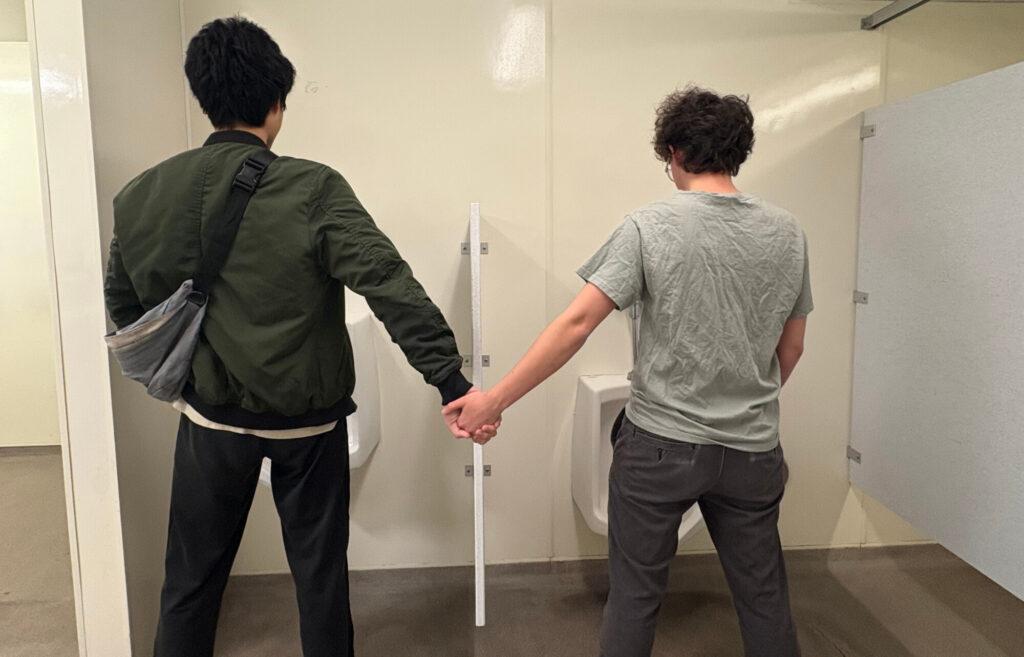
“We may not be able to reach across the isle, but we sure can reach across the stall,”
said one bathroom-goer.
Photo by Justin Xu
Recently, a proposed bill mandating that public bathrooms install partitions between urinals has become a topic of national debate. Congressman Brendan Boyle (D-Pennsylvania), who initially proposed the bill, explained that it does not concern “the janitors whose working conditions are constantly updating downwards, and they likely have, on average, 5.6 other part-time jobs to worry about.” Instead, the policy is centered around individual privacy.
The proposed bill, dubbed “Pee for Privacy” (PP), has received bipartisan support across the political spectrum. Michelle Kimberleigh, president of the conservative Christian activist group Pennsylvania Elite’s Newly Incorporated Society, expressed her support for the bill. “My sons’ urination ritual is like confession. It’s meant to be a personal and private matter that other boys and men should not have access to.”
Several liberal youth groups based in Philadelphia also support the Pee for Privacy bill and concur that the matter of personal privacy should not be taken lightly: “Where is the government pouring our tax money if not into supporting the people’s rights to privacy? Stop flushing our hard-earned dollars down the toilet!”
Members of the younger generation, primarily young men, have been posting in support of the Pee for Privacy bill on X, formerly known as Twitter, with one user @thecirclife posting a photo depicting a muscular, bearded cartoon man expressing pleasure at the concept of urinal partitions with the caption, “Keep my penis incognito.” Such discourse has revealed that despite usual splits in ideology, both parties have been able to agree that the “public” in public bathrooms does not refer to the state of people’s genitals.
There is still some fringe opposition to what has been called “a rare example of American unity.” Namely, the small yet influential minority group of American CEOs have spoken out against what they called “the woke egalitarian mobs.” Notably, Kirk Allen, CEO of Sloan — the number one producer of urinals in the US — stated, “Instead of putting all the burden on the president, who is working hard to speedrun executive orders, we should transform public bathrooms into private businesses in which consumers can enjoy excreting what they just ate by paying for a monthly subscription fee to have their private bathrooms.”
To the surprise of many Americans, President Donald Trump announced on his newly pardoned X account that he is “on the side of the people — at least for now.” A recent X he posted, formerly known as a tweet, read, “I know we are all worrying about those people coming into our great nation from across the border, so I am glad that everyone is finally agreeing with me on this big, beautiful bill, even though the corrupt and morally bankrupt Democrats may have been saying for some time that they hate TRUMP and all I do. I just think building a wall is always a good option.”
“Maybe we shouldn’t be so petty and sensitive,” said Chairwoman Beth C.W. Rume of the National Board of Bathroom Regulations (NBBP). “I teach my son to be strong and not care about people staring at his penis. Besides, who would actually look at other people’s penises in public bathrooms, am I right?” It was later reported by an anonymous whistleblower that Rume had been embezzling funds from the NBBP in order to build a golden toilet in the middle of her garden for, as she has since stated in her police confession, “artistic purposes that you poor people could never understand.”
For now, the self-proclaimed “PP-ers” continue occupying public bathrooms, fighting for their bill to be legislated. “The invaluable takeaway is that most Americans agree on at least one thing,” said Boyle. “When urinals divide, people unite.”











